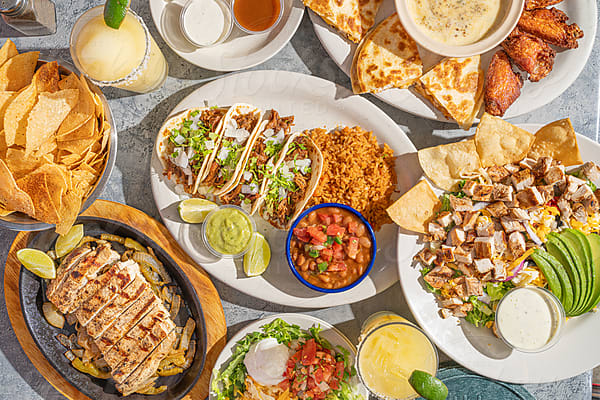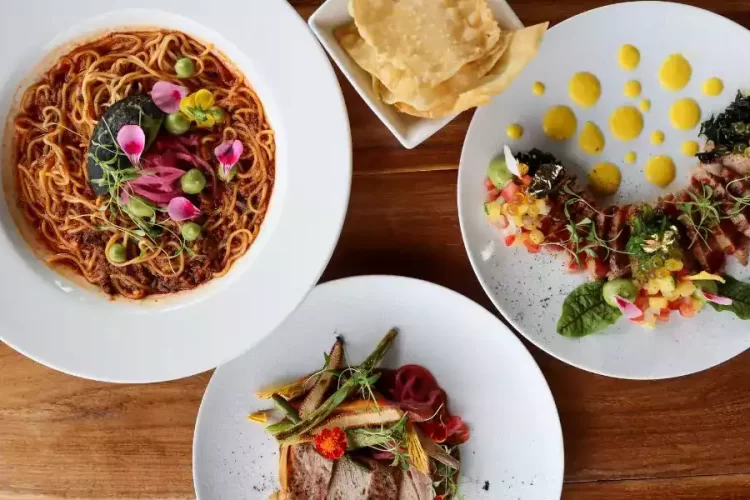A Culinary Journey Through Fort Worth’s Mexican Heritage
The Origins of Mexican Cuisine in Texas
Mexican cuisine, with its intricate web of flavors and textures, has deep roots in Texas, influenced largely by the fusion of indigenous ingredients and Spanish culinary traditions. Fort Worth, a vibrant cultural hub in Texas, epitomizes this culinary blend. The city’s history is deeply intertwined with Mexican heritage, primarily stemming from the arrival of Spanish explorers and settlers in the 16th century. The adaptation and innovation of traditional dishes stemmed from local ingredients, leading to the emergence of distinct Tex-Mex cuisine that is prevalent in Fort Worth today. Known for its rich agricultural landscape, Texas provided diverse produce, meats, and spices that have become staples in Mexican cooking.
Fort Worth’s culinary landscape showcases classic dishes with regional twists. For instance, chilies that are central to flavorful salsas have origins dating back to Aztec and Mayan cultures. Corn, which is a fundamental ingredient in Mexican gastronomy, not only finds expression in tortillas but also in tamales, cornbread, and more. The incorporation of beans, regarded as a vital protein source by ancient civilizations, has been a staple in Fort Worth’s kitchens and tables alike. As you traverse the city exploring its myriad of Mexican food in Fort Worth, you’ll discover how the past intricately weaves itself into the present, conveying stories, traditions, and flavors that define Fort Worth’s rich Mexican culinary landscape.
Cultural Influences Shaping Fort Worth’s Flavor Palette
The flavor palette of Fort Worth’s Mexican food is not created in a vacuum; rather, it is a result of historical migrations and cultural exchanges. The influence of Mexican culture can be traced through various periods; notably, the Mexican War and the subsequent annexation of Texas in the 19th century introduced a plethora of Mexican residents into the region. Over the decades, the diverse population brought with them their own culinary practices, resulting in a blend of authentic Mexican flavors with Southern U.S. influences, often referred to as Tex-Mex.
This cultural coalescence is evident in the use of unique ingredients and preparation methods found in local dishes. For example, barbacoa, traditionally made from lamb or goat and slow-cooked in an underground pit, has evolved to include the use of brisket – a nod to Texas’s cattle ranching history. Moreover, ingredients like cheese, once Americanized, have been weaved into traditional Mexican recipes, elevating standard fare to innovative gastronomic experiences.
Fort Worth celebrates its culinary diversity through community events and cooking classes that showcase authentic Mexican recipes alongside Tex-Mex favorites. This commitment to preserving and evolving Mexican culinary traditions speaks to the city’s respect for its roots and commitment to embracing the future of its cuisine.
Flagship Dishes You Can’t Miss
Beyond Tacos: Discover the Secret Gems of Local Menus
While tacos are undoubtedly a hallmark of Mexican cuisine across the United States, Fort Worth invites you to delve further into a rich tapestry of lesser-known dishes that deserve equal acclaim. At the forefront are enchiladas, which consist of corn tortillas rolled and stuffed with a variety of fillings—these can range from slow-cooked meats to cheese, smothered in a smoky chili sauce that belies a world of flavor. Each establishment boasts its unique take on this classic, from the rustic appeal of family-run diners to upscale eateries offering gourmet versions with inventive sauces and organic ingredients.
Sopes are another iconic dish often overlooked by those new to Mexican cuisine. These thick corn masa rounds serve as a base for a variety of toppings, such as seasoned meats, refried beans, lettuce, cheese, and salsa, culminating in a mini culinary masterpiece that captures the essence of Mexican flavor. Fort Worth celebrates these regional finds by dedicating entire meals to sopes—each bite transports diners right to a bustling market in Mexico itself.
If you venture further into the unique offerings, you’ll encounter dishes such as mole poblano, a rich and complex sauce traditionally made from chili peppers, chocolate, and a variety of spices, often paired with chicken or turkey. This dish is a perfect representation of how Mexican food marries sweetness with savory elements, embodying the highly developed flavor profiles of the cuisine. Whether enjoyed in a casual setting or crafted into a gourmet experience, these dishes transcend the limitations often placed on Mexican cuisine.

The Art of Tamales: Tradition Meets Innovation
Tamales represent one of Mexico’s most cherished culinary traditions, deeply embedded in familial and cultural significance. In Fort Worth, the art of making tamales is treated with reverence, often passed down through generations. Typically crafted from masa (corn dough) and filled with meats, vegetables, or sweets, they are wrapped in corn husks or banana leaves before being steamed to perfection. The process itself demands precision and care, which is why many families engage in ‘tamale-making parties’ during holidays—a heartwarming element of community bonding and cultural preservation.
What stands out in Fort Worth’s culinary scene is how local chefs reinterpret this tradition, infusing contemporary flair while honoring the original techniques. For example, gourmet tamales might feature fillings like duck confit or roasted vegetables layered with artisanal cheeses. Some restaurants have even taken it a step further, pairing tamales with innovative salsas and garnishes that play on traditional flavors while exploring new profiles.
Moreover, tamale festivals in Fort Worth celebrate this iconic dish, showcasing local variations that compete with established recipes. Patrons can experience live cooking demos, sample a range of unique tamales, and appreciate the vital role tamales play in expansively connecting the community through shared culture.
Exploring Regional Variations: What Sets Fort Worth Apart
The Distinct Flavors of Northern Mexican Cuisine
When exploring Mexican cuisine, one cannot overlook the regional differences that add a compelling dimension to the flavors experienced in Fort Worth. Northern Mexican cuisine, which prominently influences Fort Worth’s offerings, exhibits variations in spice usage, choice of ingredients, and preparation methods. The northern region of Mexico is characterized by a penchant for beef and grilled specialties due to the area’s ranching heritage, a focus that resonates with Fort Worth’s own cattle-raising history.
Unlike the more spice-heavy cuisines found in southern regions, northern Mexican cuisine tends towards milder flavors, with a heavy emphasis on hearty meats and robust grilling techniques. Dishes like carne asada, where marinated beef is grilled to perfection, are prime examples of this culinary style. In Fort Worth, local restaurants have adopted these techniques and self-appointed them as the ‘steak capital of Texas,’ crafting wood-fired delights that pay homage to both Mexican tradition and Texas pride.
Cargados—loaded baked potatoes topped with ingredients like beef, cheese, and salsa—have become a go-to in Fort Worth dining. This dish represents the fusion of Northern Mexican influences into the Texan dining consciousness, serving as an exemplary showcase of how cuisine can evolve while remaining grounded in its roots. Expect to encounter brisket tacos or queso with chilies that blend Tex-Mex favorites with Northern elegance, resulting in a thriving culinary scene that can only be experienced in Fort Worth.
Crossover Creations: Fusion Dishes That Wow
Fort Worth’s gastronomic landscape isn’t solely defined by its dedication to authentic Mexican traditions; rather, it thrives on a delicious fusion of flavors brought forth by culinary innovators. Crossover creations enhance the diverse character of Fort Worth’s food scene, embodying an adventurous spirit that blends the best of both worlds. A prime example of this adventurous crossover is achieved through the introduction of unique ingredients like locally sourced vegetables, craft beers, and specialty cheeses into traditional Mexican recipes, which adds a modern twist without sacrificing authenticity.
Moreover, the rise of food trucks and inventive casual dining establishments serves as incubators for these fusion dishes. Imagine tacos filled with Korean barbecue, drizzled with spicy gochujang sauce and finished with fresh cilantro and lime. These food stalls often reflect the chef’s heritage, introducing patrons to their unique culinary perspective. Diners are encouraged to explore eclectic offerings, each one potentially sharing stories of a chef’s life and travel experiences.
Brunch menus that showcase chilaquiles topped with poached eggs or creative breakfast burritos filled with Texan staples highlight how Fort Worth effectively represents the melding of cultures. This culinary hybridization emphasizes a forward-thinking food culture that celebrates the past, present, and future of Fort Worth’s gateway to Mexican cuisine.
Savory Experiences: Where to Savor Mexican Food in Fort Worth
Top Restaurants to Indulge Your Taste Buds
Fort Worth’s dining scene is a paradise for lovers of Mexican food, brimming with diverse establishments ranging from charming family-run eateries to internationally recognized fine dining. If you’re seeking to indulge your taste buds, start at the renowned Mi Cocina, a staple amongst locals famous for its traditional Monterrey-style dishes and vibrant ambiance. Their ‘Macho Nachos’ are a fan favorite—crisp tortilla chips heaped with melted cheese, jalapeños, and your choice of protein, served with zesty salsa and guacamole.
Another must-visit is Joe T. Garcia’s, where dining becomes a full sensory experience amidst beautiful gardens and outdoor patios. Known for their salsa and legendary fajitas, Joe T. Garcia’s commands a lasting presence in Fort Worth’s Mexican dining landscape. An essential stop for first-time visitors is the lively atmosphere complemented perfectly by live music on the weekends.
For those who crave gourmet offerings, Del Frisco’s Grille melds steakhouse cuisine with Mexican flair, providing elevated interpretations of classic dishes. Here, the steak taco is transformed into a delightful culinary experience topped with zesty chimichurri. With focus on local sourcing, the freshness of ingredients translates into each bite, affirming Fort Worth’s identity as a culinary destination.
Food Festivals and Events Celebrating Mexican Culture
No exploration of Fort Worth’s Mexican fare is complete without diving into the city’s vibrant food festivals and cultural events that celebrate its heritage. Each year, events such as the Fort Worth Food + Wine Festival provide a platform for local restaurants to showcase their best dishes, including unique Mexican flavors. Attendees experience tastings, chef’s demonstrations, and discussions that emphasize the importance of preserving culinary traditions while exploring new horizons.
The Dia de los Muertos festival stands out as a festival that not only celebrates life and death but brings forth an explosion of flavors, spices, and dishes commemorating Mexican heritage. Here, vendors prepare classic dishes such as pan de muerto and tamales, which visitors relish as they explore artistic displays honoring those who have passed.
In addition, the weekly Farmers Markets held throughout Fort Worth bring awareness to local cuisines by featuring artisanal products, fresh ingredients, and traditional recipes often showcased during cooking demonstrations by esteemed local chefs. Engaging with this aspect of Fort Worth adds a tangible layer to the exploration of its culinary scene, enabling visitors and locals alike to connect with the food and the stories behind it.

